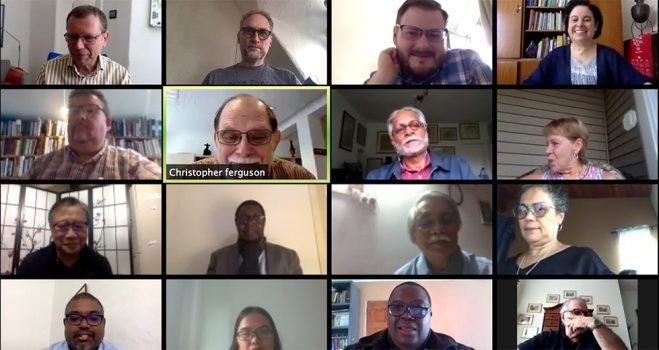A global consultation began a process for the World Communion of Reformed Churches (WCRC) to discern how the Communion can “provide for a prophetic theological response” to the COVD-19 pandemic and to prepare the Communion to move towards becoming a confessing church in terms of the “global apartheid” that the pandemic has unveiled.
“COVID-19 has opened our eyes on many challenges and realities,” said Najla Kassab, WCRC president. “In the midst of our pain and struggle we see hope, mainly because God is with us and we are together, strengthening one another. This is a time of building a strong communion, a prophetic one, an impactful presence in every place that hurts.”
“In our conversation today we are trying to make the immediate response that will involve all levels of our family and will be both specific to dealing with the COVID crisis and also moving forward to our long-term goals,” said Chris Ferguson, WCRC general secretary. “This is to start a conversation, to enable a communion-wide discernment on the crisis and provide a theological response.”
A ten-point paper was presented for discussion and introduced by Philip Vinod Peacock, WCRC executive secretary for justice and witness; Hanns Lessing, WCRC executive secretary for communion and theology; and Meta Ginting, WCRC intern from Gereja Batak Karo Protestan (GBKP).
“What we do not need is a return to normal,” said Peacock. “What is normal is what made this crisis what it is. This is an opportunity to build a new world.”
“The virus exposes the segregation we have built into our societies and the whole world over,” said Lessing. “We are very much called to respond on the theological level, but also on the political level, and also on the way we are being church.”
“In this context of pandemic, churches and the faith based community should play their role as the agency of change and transformation from below,” said Ginting. “As we look forward to the ‘new normal’ we seek to recover together and work together for justice and peace in the future.”
The discussion, moderated by Lungile Mpetsheni, of the Uniting Presbyterian Church in Southern Africa, drew a wide variety of responses from the global group.
“The Reformation was born in the aftermath of the black death pandemic. This pandemic pushes us to revisit our own vision and the theological vocabulary we are using,” Joas Adiprasetya of WCRC Indonesia.
“I think the COVID crisis really calls on us to reframe the script we’re using,” said Angela Martins, convener of the Caribbean and North American Area Council. “We are required by this virus to step outside of our traditional, single, global box and bring a renewed and refreshed theological understanding.”
“We need to reimagine, really reimagine the whole economy of life,” said Rathnakara Sadananda, a member of the WCRC Strategic Plan Programme Group (SPPG). “This is something that calls for a reformation.”
“It raises the big question about what it means to be church and living with uncertainties. It is redefining what it means to be church,” said Roderick Hewitt, of the SPPG. “They are rediscovering a different way of being church that does not carry all of the paraphernalia. This is a time of revisiting, the theological, the language, just all of these.”
Mpetsheni, noting that “this is just the beginning of a process,” concluded the meeting by stating that a working group will be established to carry the process forward, moving the discernment into regional settings, along with ecumenical partners.
Anticipated outcomes of the process include:
- Drafting of a WCRC statement on the Covid-19 pandemic
- Production of resources that would allow member churches and regions to participate in the process
- Organization of webinars to address crucial topics
- Addressing important justice questions in other WCRC programmes
- Exploring the wider vision that will emerge from the COVID-19 response that will guide the organization on the way to the 2024 General Council
The 30+ participants were geographically diverse, “zooming” in from Colombia to Australia, and included WCRC officers, Executive Committee members, regional leaders, SPPG members, representatives from the Council for World Mission, and staff.
The consultation was held on Friday, 19 June.


